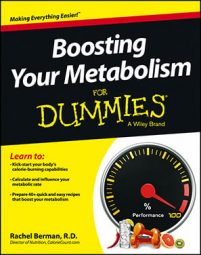The first meal of the day is called breakfast because you’re literally breaking a fast of many hours without food. Your metabolism is moving less overnight when you’re sleeping because you’re not physically active or eating.
When you wake up, you want to eat something within a few hours so that you wake up your metabolism too. That gets you geared up to digest and use food for fuel all day long.
If you skip breakfast, you’re more likely to replace those calories with more snacking or bigger meals throughout the day, be overweight, and meet less of your micronutrient needs (nutrients like vitamins and minerals that are required in small amounts by the body for metabolism and growth) throughout the day.
Not only do breakfast eaters start the day off on a healthy note with a balanced meal, they’re also more likely to do the following:
Lose weight and keep it off: People who eat breakfast eat less throughout the day and have 30 percent lower overweight/obesity rates. Also, 78 percent of people in the National Weight Control Registry report eating breakfast every day. These are people who have lost at least 30 pounds and successfully maintained their weight for a minimum of one year. 90 percent eat breakfast at least 5 days per week.
Meet nutrient needs: People who skip breakfast are less likely to get their daily requirements of fiber and calcium. Because breakfast is a good opportunity to get whole-grain cereals, fruits, milk, and yogurt, people who skip might consume less of these foods. And people make more nutritious choices all day long with a balanced breakfast.
Exercise: Breakfast eaters are more likely to make time for exercise during the day. Maybe you have more energy to be active or you’re up early exercising and, therefore, eat breakfast. Whichever it is, these two behaviors are linked.
Be more focused: Studies find that children have better attention spans and memory skills in school with a solid breakfast in them. This is true for adults, too.
If you never eat breakfast, start small. If it’s because you don’t feel hunger, maybe you’re eating too much late at night. Break the cycle of not eating much during the day and nighttime overeating. Start small and build up to something more substantial as you get into a routine.
Having a combination of lean protein and fiber is particularly important in the morning to keep you satisfied until lunchtime. These nutrients take long to digest, help prevent blood glucose spikes, and fill you up most effectively.
Here are some ideas:
If you typically have corn flakes, switch to a high-fiber cereal and/or add berries to your bowl.
If you already eat oatmeal, top with a serving of chopped nuts or pair with a hard-cooked egg for a dose of protein.
If you have a muffin, eat half (it’s probably too big) and add a “curber” like low-fat yogurt to round it out.
If you normally have a bagel, switch to two slices of whole wheat bread with peanut butter and sliced banana.
If you only have coffee, build up with, first, a piece of fruit, then a serving of yogurt, and then mix in high-fiber cereal for a healthy parfait.
If you need something to bring with you on-the-go, whip up a smoothie with fruit, low-fat dairy, or soy milk.

